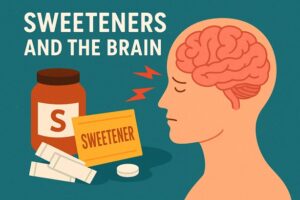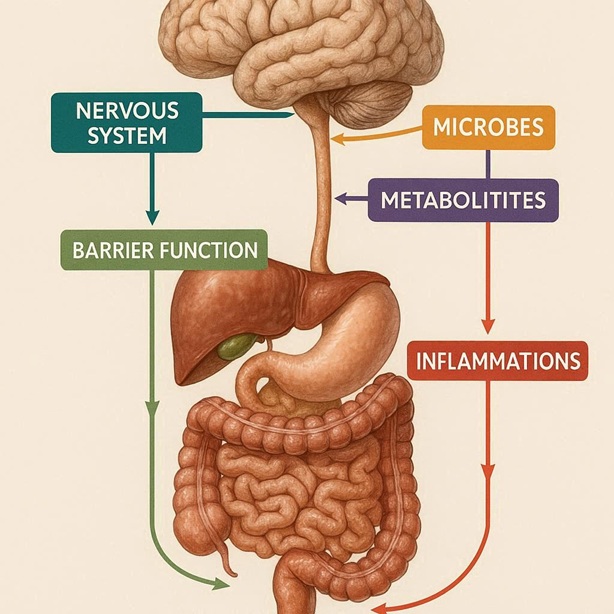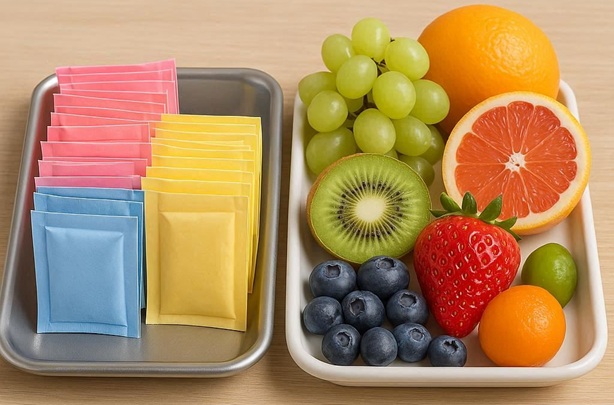 Back in July, I explored the ongoing debate around artificial sweeteners — substances that promise all the sweetness without the calories. At that time, most of the discussion centered on cancer risk, metabolic effects and the gut microbiome. Now, a new study published in Neurology (September 2025) adds an important and sobering dimension: the potential impact of artificial sweeteners on brain health.
Back in July, I explored the ongoing debate around artificial sweeteners — substances that promise all the sweetness without the calories. At that time, most of the discussion centered on cancer risk, metabolic effects and the gut microbiome. Now, a new study published in Neurology (September 2025) adds an important and sobering dimension: the potential impact of artificial sweeteners on brain health.
A New Link: Sweeteners and Cognitive Decline
Researchers in Brazil followed more than 12,000 middle-aged adults for an average of eight years. They found that people consuming the highest amounts of artificial sweeteners — especially aspartame, saccharin, acesulfame-K, sorbitol and xylitol — experienced faster declines in memory and thinking skills compared to those who consumed the least.
- The rate of decline was equivalent to about 1.6 years of extra brain aging.
- The effect was most pronounced in people under 60 and those with diabetes.
- Tagatose, one of the sweeteners studied, did not show a link to decline.
Importantly, this was an observational study, meaning it shows association, but can not prove cause and effect. Still, the large sample size and consistency of the findings make it a signal worth paying attention to.
How Could Sweeteners Affect the Brain?

Scientists don’t yet have definitive answers, but several theories are emerging:
- The Gut–Brain Axis
Artificial sweeteners can alter the gut microbiome, which in turn influences inflammation and brain function. Disrupted gut bacteria may set off a cascade of low-grade inflammation that eventually reaches the brain. - Insulin and Glucose Regulation
Even without calories, the taste of sweetness can trigger insulin responses. Over time, this mismatch may contribute to insulin resistance — a key risk factor for cognitive decline, especially in people with diabetes. - Vascular Health
Chronic inflammation and metabolic stress can damage small blood vessels in the brain, reducing oxygen and nutrient delivery. This so-called small vessel disease is a recognized driver of memory problems and dementia.
Putting the Findings in Context
Before anyone panics and swears off diet soda forever, a few caveats:
- The study measured consumption levels, but participants self-reported their diets, which introduces some uncertainty.
- The differences in brain aging, while meaningful, were modest — equivalent to roughly a year and a half over the study period.
- More research is needed to confirm these findings and determine whether certain sweeteners are more problematic than others.
Still, this is not the first time artificial sweeteners have raised red flags beyond simple calorie counting. Together with earlier research on metabolism and the gut, the new cognitive angle underscores that these compounds are not necessarily “free passes” to sweetness.
What This Means for You
For most people, occasional use of artificial sweeteners is unlikely to cause harm. But if you’re relying on them daily, especially in multiple servings, it may be wise to rethink the habit.
- Moderation remains key. Too much of anything is bad for you.
- Whole foods first. Opt for naturally sweet foods like fruit, rather than highly processed alternatives.
- If you have diabetes, pay particular attention, since the study suggests you may be more vulnerable to these effects.
The Bottom Line
Artificial sweeteners were once seen as the safe solution to cutting sugar, but the science is evolving and what seemed like a simple swap now looks more complicated. The latest research hints that while they may protect your waistline, artificial sweeteners could come at a cost to your brain over the long run.
As always, balance wins: reducing both added sugar and artificial substitutes, while focusing on nutrient-dense, minimally processed foods, is still the most reliable path to long-term health for both the body and the mind.

Discover more from Tales of Many Things
Subscribe to get the latest posts sent to your email.
